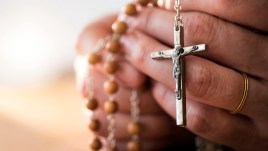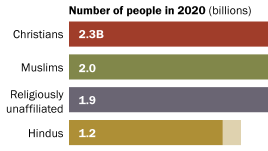
How religious is your state?
Explore our interactive database to find out how religious adults are in your state based on service attendance, prayer, belief in God, and importance of religion.
Numbers, Facts and Trends Shaping Your World
Explore our interactive database to find out how religious adults are in your state based on service attendance, prayer, belief in God, and importance of religion.
All
Publications
During his 2008 presidential campaign, then-candidate Barack Obama said that he intended to overturn President George W. Bush’s policy of allowing faith-based groups that receive federal funding to consider a potential employee’s religion when making hiring decisions. Although a 1972 civil rights law generally exempts religious groups from the prohibition on religious discrimination in hiring, […]
Overview I. Religious Affiliation and Demographics II. Religious Beliefs and Practices III. Social and Political Views Overview While the U.S. is generally considered a highly religious nation, African-Americans are markedly more religious on a variety of measures than the U.S. population as a whole, including level of affiliation with a religion, attendance at religious services, […]
A new analysis by the Pew Research Center’s Forum on Religion & Public Life finds that African-Americans are markedly more religious on a variety of measures than the U.S. population as a whole. Source: Pew Forum U.S. Religious Landscape Survey, conducted in 2007, released in 2008 Data tables available in the full report.
In his Jan. 20 inaugural address, President Barack Obama said, “The success of our economy has always depended not just on the size of our gross domestic product, but on the reach of our prosperity.” Surveys conducted by the Pew Research Center’s Forum on Religion & Public Life find that income varies greatly within and […]
Updated Jan. 15, 2009 The Western Wall and the Dome of the Rock, in Jerusalem’s Old City. (Photo: Benjamin Rondel/Corbis) The Pew Research Center’s Forum on Religion & Public Life has assembled a variety of resources on the Israeli-Palestinian conflict, including reports, event transcripts, polling data and news clips. Pew Forum Resources Event America and […]
Nearly half the nation’s presidents have been affiliated with the Episcopal or Presbyterian churches. John F. Kennedy remains the only Catholic to have held the nation’s highest office. Only three U.S. presidents — Thomas Jefferson, Abraham Lincoln and Andrew Johnson — have been unaffiliated with a specific religious tradition. Sources: Ronald Reagan: The Ronald Reagan […]
Members of Congress are often accused of being out of touch with average citizens, but an examination of the religious affiliations of U.S. senators and representatives shows that, on one very basic level, Congress looks much like the rest of the country. Although a majority of the members of the new, 111th Congress, which will […]
Born near Amritsar, India in 1899, Dalip Singh Saund was an unlikely future candidate for national office when he came to the United States in 1920 to study food preservation at the University of California, Berkeley. But in 1956 Saund, whose career would span the vocations of mathematician, farmer, author, activist and judge, became the […]
Nearly half of U.S. adults are connected to Catholicism. Read about going to Mass, Communion, confession and more.
Christians remain the largest religious group, and Muslims grew the fastest from 2010 to 2020. Read how the global share of Buddhists, Hindus, Jews and the religiously unaffiliated changed.
After years of decline, the U.S. Christian share now shows signs of leveling off. The new Religious Landscape Study explores trends in identity, beliefs and practices.
The Global Religious Futures (GRF) project is jointly funded by The Pew Charitable Trusts and The John Templeton Foundation. Here are some big-picture findings from the GRF, together with context from other Pew Research Center studies.





